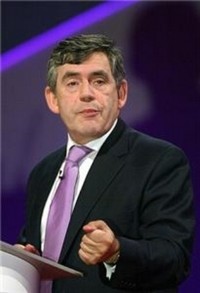Gordon Brown Calls Labour to "Change the World Again"
In his make-or-break speech to the party's annual conference Prime Minister Gordon Brown has urged Labour to "change the world again".

He said voters at the election, due to be held by next June, would have the "biggest choice for a generation".
He set out the differences between Labour and the Conservatives on the economy in an address seen as vital to ending threats to his leadership and lifting party morale.
"In a crisis what the British people want to know is that their government will not pass them by on the other side but will be on their side," he said.
"Because the decent, hard working majority are getting evermore angry - rightly so - with the minority who who will talk about their rights but never accept their responsibilities."
He said: "Our country confronts the biggest choice for a generation. It's a choice between two parties, yes. But more importantly a choice between two directions for our country," BBC News reports.
Reuters quoted Brown as saying, "I can announce today that in Labour's next manifesto there will be a commitment for a referendum to be held early in the next Parliament. It will be for the people to decide whether they want to move to the Alternative Vote."
Prime Minister said, "And so where there is proven financial corruption by an MP and in cases where wrongdoing has been demonstrated but Parliament fails to act we will give constituents the right to recall their Member of Parliament," Reuters reports.
It was also reported, some critics within his Labour Party openly question whether Brown should lead the organization into an election, while Brown was forced to rebut rumors about his physical and mental health in an uncomfortable BBC interview Sunday.
Even his key Cabinet ally, the influential business secretary Peter Mandelson, said Brown must show more "razzmatazz," to entice voters disillusioned with his leadership.
An Ipsos MORI poll published Tuesday put Brown's Labour in third place for the first time since 1982 — behind both the opposition Conservatives and Liberal Democrats.
The Conservatives, who are widely expected to win power at the next election, had 36 percent, the Liberal Democrats had 25 percent and Brown's Labour had 24 percent. Ipsos MORI interviewed 1,003 people by telephone between Sept. 25-27, no margin of error was given, but in samples of a similar size it is plus or minus 3 percentage points, The Associated Press reports
Subscribe to Pravda.Ru Telegram channel, Facebook, RSS!





